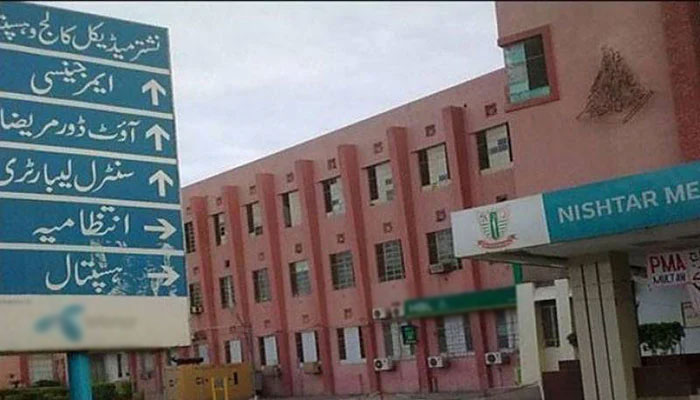Dialysis machine fault: AIDS transmission fears at Nishtar Hospital
Negligence may cause loss of lives in terms of an increase in HIV-positive patients after dialysis of an HIV carrier
MULTAN: A state of malfunctioning has been detected at Nishtar Hospital Multan dialysis ward where the South Punjab Additional Chief Secretary visited to inquire about the malfunctioning of the dialysis machine. However, the doctors technically satisfied him but he ordered initiation of inquiry into the transmission of HIV and AIDS to dialysis patients.
Senior doctors at Nishtar, on the condition of anonymity, told The News that the poor patients move to private dialysis clinics due to malfunctioning and disorder of dialysis machines after failing to get treatment at the hospital. The private clinics do not have properly sterilised machines and dialysis patients easily fall victim to HIV and other transmittable viruses.
The senior doctors said that the dialysis ward at Nishtar Hospital roughly dealt with such HIV and AIDS carrier patients and instead of conducting their screening before dialysis, created an ample environment to spread the virus through non-screening of blood and unsterilized dialysis machines. The negligence may cause loss of lives in terms of an increase in HIV-positive patients after dialysis of an HIV carrier. The virus spread from a dialysis machine to other patients, leading to dozens undergoing dialysis from the infected machines, according to doctors.
The senior doctors said that nobody may predict how many patients have been infected with HIV through dialysis machines and where the number of HIV-infected patients will stand.
Thirty HIV-positive patients have been reported at Nishtar Hospital’s dialysis ward in Multan. However, Dr. Kazim Khan, the hospital’s Medical Superintendent (MS), has strongly denied that 30 or more patients have contracted HIV at the hospital. He clarified that the hospital routinely treats HIV-positive patients on dedicated dialysis machines and that all patients undergo thorough screening before treatment.
MS Khan explained that the recent incident involved a patient who had previously tested negative for HIV but was later found to be positive. An inquiry committee has been formed to investigate the matter.
“About 29 machines are fully operational in the dialysis unit. A dialysis machine for hepatitis B has been damaged during repair. About 13 machines are rendering Hepatitis C service. Two machines are reserved for HIV patients. More than 240 dialysis patients are registered currently,” the MS added.
-
 Fresh Details Of King Charles, Queen Camilla's US Visit Emerge Amid Andrew Investigation
Fresh Details Of King Charles, Queen Camilla's US Visit Emerge Amid Andrew Investigation -
 Iran 'set To Buy' Chinese Carrier-killer Missiles As US Forces Gather In Region
Iran 'set To Buy' Chinese Carrier-killer Missiles As US Forces Gather In Region -
 Prince Harry And Meghan Unlikely To Meet Royals In Jordan
Prince Harry And Meghan Unlikely To Meet Royals In Jordan -
 Hero Fiennes Tiffin Shares Life-changing Advice He Received From Henry Cavill
Hero Fiennes Tiffin Shares Life-changing Advice He Received From Henry Cavill -
 Savannah Guthrie's Fans Receive Disappointing News
Savannah Guthrie's Fans Receive Disappointing News -
 Prince William Steps Out For First Solo Outing After Andrew's Arrest
Prince William Steps Out For First Solo Outing After Andrew's Arrest -
 Jake Paul Chooses Silence As Van Damme Once Again Challenges Him To Fight
Jake Paul Chooses Silence As Van Damme Once Again Challenges Him To Fight -
 Google Disrupts Chinese-linked Hacking Groups Behind Global Cyber Attacks
Google Disrupts Chinese-linked Hacking Groups Behind Global Cyber Attacks -
 Four People Killed In Stabbing Rampage At Washington Home
Four People Killed In Stabbing Rampage At Washington Home -
 Meghan Pushes Prince Harry Into Territory That’s Dangerous To His Brand: ‘She Isn’t Hearing A Word Of It’
Meghan Pushes Prince Harry Into Territory That’s Dangerous To His Brand: ‘She Isn’t Hearing A Word Of It’ -
 Christina Applegate Reflects On Lasting Impact Of Being Molested In Childhood
Christina Applegate Reflects On Lasting Impact Of Being Molested In Childhood -
 Martin Short Makes Big Decision Following Tragic Death Of Daughter
Martin Short Makes Big Decision Following Tragic Death Of Daughter -
 Antarctica’s Mysterious ‘gravity Hole’: What’s Behind The Evolution Of Earth’s Deep Interior?
Antarctica’s Mysterious ‘gravity Hole’: What’s Behind The Evolution Of Earth’s Deep Interior? -
 Hilary Duff Addresses Ashley Tisdale's 'toxic Mom Group' Claims And Matthew Koma's Firey Response
Hilary Duff Addresses Ashley Tisdale's 'toxic Mom Group' Claims And Matthew Koma's Firey Response -
 Jack Hughes's Proximity To Trump Angers Tate McRae Fans
Jack Hughes's Proximity To Trump Angers Tate McRae Fans -
 Neve Campbell Opens Up About Her 'difficult Decision' To Not Sign 'Scream 6'
Neve Campbell Opens Up About Her 'difficult Decision' To Not Sign 'Scream 6'




